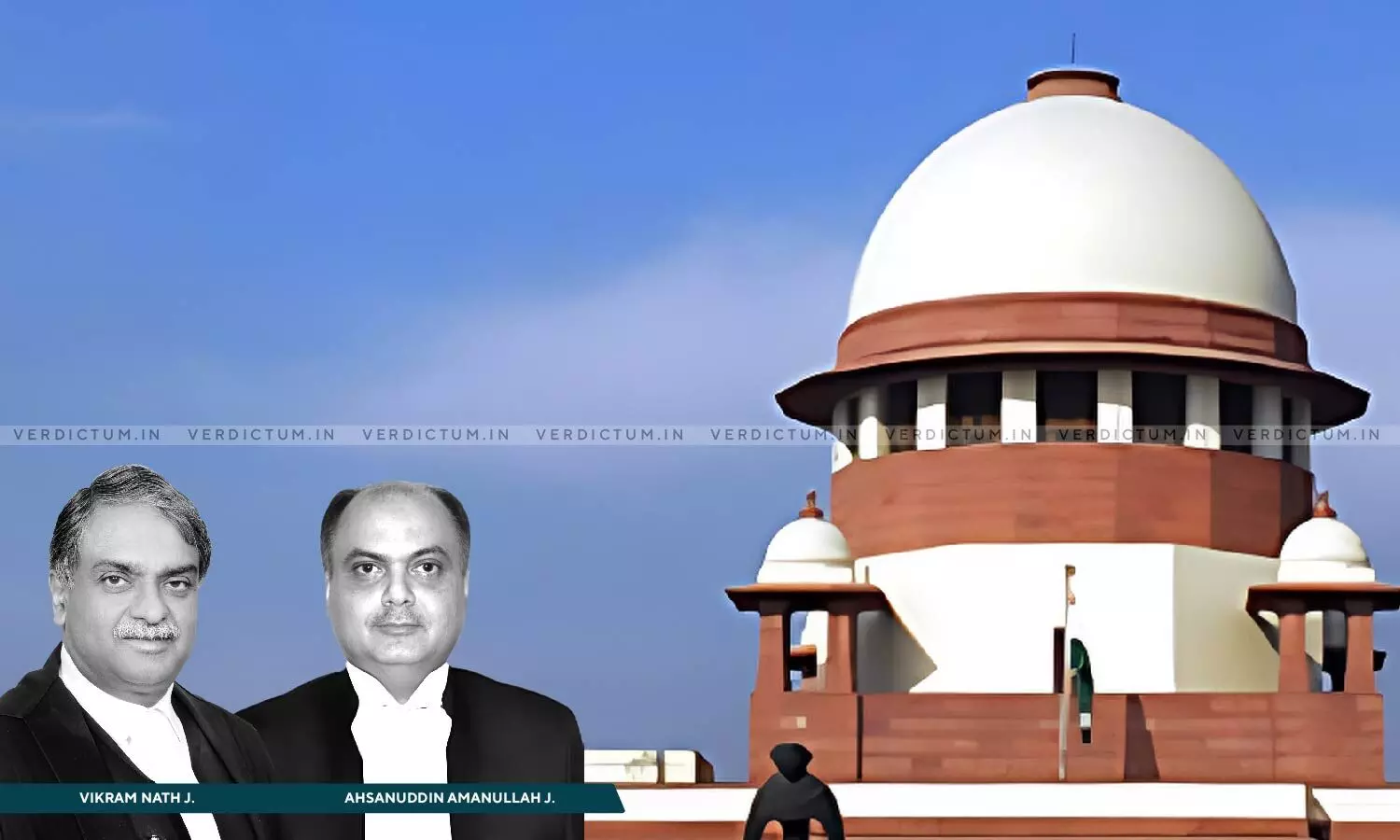
Pendency Of Registration Due To Deficiency In Stamp Duty Cannot Benefit Vendor Who Executed Sale Deed & Received Consideration: SC
 |
|The Supreme Court has held that the pendency of registration due to deficiency in stamp duty cannot benefit the vendor, who has forfeited all rights by executing the sale deed and receiving the sale consideration, thus he cannot reclaim ownership of the transferred land merely because the document of sale is pending for registration.
In that context, the Bench of Justice Vikram Nath and Justice Ahsanuddin Amanullah observed that, "pendency of registration on account of deficiency cannot enure any benefit to the vendor, who has already eliminated all his rights by executing the sale deed after receiving the sale consideration. He cannot become the owner of the transferred land merely because the document of sale is pending for registration. It is the purchaser who cannot produce such document which is pending registration with respect to the immovable property in evidence before the Court of law as the same would be inadmissible in view of statutory provision contained in the TP Act as also the Act, 1908."
In 1985, Respondent No. 2 executed a sale deed in favour of Appellant No. 1 and his minor brother, represented by their mother. However, the deed could not be registered due to insufficient stamp duty and remained pending with the Sub-Registrar.
In 2010, Respondent No. 2 executed a Conveyance Deed for the same property in favor of Respondent No. 1, a subsequent purchaser. Upon learning this, the appellants pursued the registration of their sale deed, which was completed in 2011. When Respondent No. 1 attempted to interfere with their possession, the appellants filed a suit to cancel the sale deed in Respondent No. 1's favour and sought a permanent injunction.
The Trial Court dismissed the suit in 2016, deeming the appellants' sale deed void since they were minors at the time of execution. The District Judge, on appeal, overturned the Trial Court's judgment and decreed the suit. Respondent No. 1 challenged this decision in the High Court, which allowed the appeal and dismissed the suit in 2022. The appellants, aggrieved by the High Court's judgment, approached the Supreme Court.
The Supreme Court, after reviewing the material on record, observed that the sale deed of 1985 bore the signatures of Respondent No. 2 and the attesting witnesses, along with the necessary endorsement by the Sub-Registrar. Although the deed was impounded for non-payment of stamp duty, it was eventually registered once the duty was paid. The Court stated, "This makes it abundantly clear that the sale deed was executed...and presented before the Sub-Registrar."
The Court noted that the Trial Court and the High Court incorrectly assumed that Respondent No. 2 denied executing the sale deed and receiving any consideration. The Supreme Court pointed out that Respondent No. 2 never specifically denied these aspects, and the lower courts misread the evidence. The Court highlighted, "Both the said courts also failed to take into consideration that defendant no.1 the vendor (respondent no.2 herein) neither entered the witness box in support of his pleadings and to prove them, nor did lead any evidence, either oral or documentary, in support of his pleadings."
Additionally, the Court rejected the respondents' contention that the appellants were minors at the time of the sale deed's execution, rendering it void. The Court clarified that although Appellant No. 1's age was incorrectly recorded as 18 years, his minor brother was represented by their mother, making the sale deed valid concerning the minor brother's rights. The Court stated, "The issue of minority of appellant no.1 would also not be of any relevance...the fact remains that the mother of appellant No.1 was already representing his younger brother as guardian...it would be deemed that she was acting on behalf of both her minor sons."
Regarding the subsequent purchaser (Respondent No. 1), the Court opined that even if unaware of the prior sale, a subsequent purchaser could not be treated as a bona fide purchaser. The Court explained, "The doctrine of bona fide purchaser for value applies in situations where the seller appears to have some semblance of legitimate ownership rights. However, this principle does not protect a subsequent purchaser if the vendor had already transferred those rights through a prior sale deed."
The Court concluded that Respondent No. 1 could seek legal remedies to recover the sale consideration paid to Respondent No. 2 and directed that the sale deed in favor of Respondent No. 1 be canceled. The Court allowed the appellants' appeal, decreed the suit, and imposed an exemplary cost of Rs. 10 lakhs on the respondents.
The Court also expressed concern over the continued suffering of common people due to vendors' deceitful practices, emphasizing the need for legal intervention to protect the weak and maintain trust in the legal system. It stated, "It is in cases like these, the law comes to the aid of the weak...it is not for us to just mechanically analyse the contentious transactions but to also ensure that injustice is remedied and nobody is benefitted by their own wrongs."
Cause Title: Kaushik Premkumar Mishra & Anr vs Kanji Ravaria @ Kanji & Anr. (Neutral Citation: 2024 INSC 540)
Click here to read/download the Judgment